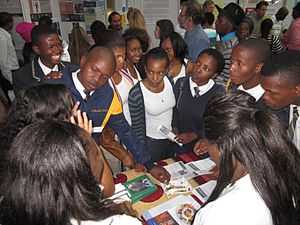African Gender Institute

The African Gender Institute (AGI) is a feminist research and teaching group that studies issues related to gender in Africa. It has become a department at the University of Cape Town (UCT), administered within the School of African and Gender Studies, Social Anthropology and Linguistics. The AGI has its own dedicated staff and has a unique degree of independence from UCT.[1]
Purpose
The AGI describes itself as specifically feminist and seeks to promote feminism on the African continent.[2] The AGI serves as a point of contact for feminist intellectuals across Africa, many of whom suffer from isolation and discrimination at their academic institutions.[3] Amina Mama—a key figure at the AGI—has argued that the organization constitutes a key exception to neoliberal commodification of and control over African academics.[4][5] A major goal of the AGI is to maintain an institutional space for African feminists to network, collaborate, teach, and research.[6]
History
The AGI grew out of the Equal Opportunities Research Project, created at the University of Cape Town in 1992 as apartheid was ending. The AGI was created in 1996, with the specific goal of advocating for female academics and intellectuals.[7]
Mama became director of the AGI in 2000 and helped to found its journal Feminist Africa.[8]
Faced with budget cuts and an shifting institutional support, the AGI focused on consolidating its core intellectual positions and its institutional position at UCT. These efforts were generally successful, and the AGI now offers a full undergraduate degree program, graduate degrees, and postgraduate work.[4]
Activities

Gender and Women's Studies for Africa's Transformation, or GWS Africa, is one of AGI's major projects. GWS Africa is an effort aimed at creating and sharing a strong intellectual core for feminists across Africa. Much of GWS Africa takes place online, through a listserv and a website. The organization generated Feminist Africa, which mostly circulates online.[4] Through GWS Africa, the AGI has been a major force for increasing women's access to internet communications.[9]
In 2000–2002, GWS Africa conducted a survey of Gender and/or Women's Studies Departments across Africa. It found that these disciplines were generally on the rise, but that many of them had adopted the mainstream Women in Development (WID) approach. This finding reinforced the AGI's desire to foster a more critical African feminist discourse, and led in 2002 to a significant pan-African feminist forum in 2002, held at UCT.[6]
References
- ↑ Gouws, Amanda (2012). "Reflections on being a feminist academic/academic feminism in South Africa". Equality, Diversity and Inclusion: an International Journal 31 (5/6): 526. doi:10.1108/02610151211235505.
- ↑ "Mission and Vision". African Gender Institute. Retrieved 2012-12-16.
Powerfully feminist in philosophy and practice the AGI offers programmes of teaching and research on gender in the contexts of, inter alia, sexuality, development, land reform, law, conflict, politics, race, economics and culture.
- ↑ See Sylvia Tamale, profiled in: Gretchen L. Wilson, "African Female Scholars Share Virtual Lifeline", Women's eNews on WorldPress, 21 December 2006.
- ↑ 4.0 4.1 4.2 Amina Mama, "Gender studies for Africa's transformation", in African Intellectuals: Rethinking Politics, Language, Gender and Development, ed. Thandika Mkandawire, London: Zed Books and CODESRIA, 2006.
- ↑ Amina Mama interviewed by Elaine Salo, "Talking about Feminism in Africa", reproduced in Women's World from Agenda, "African Feminisms I", no. 50 (2001).
- ↑ 6.0 6.1 Amina Mama (2011). "What does it mean to do feminist research in African contexts". Feminist Theory & Activism in Global Perspective: Feminist Review Conference Proceedings: e4–e20. Retrieved 2012-12-16.
- ↑ "History". African Gender Institute. Retrieved 2012-12-16.
Powerfully feminist in philosophy and practice the AGI offers programmes of teaching and research on gender in the contexts of, inter alia, sexuality, development, land reform, law, conflict, politics, race, economics and culture.
- ↑ Karen MacGregor (2006-01-13). "One-way ticket just isn't an option". Times Higher Education. Retrieved 2012-12-16.
- ↑ Hafkin, Nancy J. (2000). "Convergence of Concepts: Gender and ICTs in Africa". In Adera, Edith Ofwona; Rathgeber, Eva-Maria. Gender and the information revolution in Africa. Ottawa: International Development Research Centre. ISBN 0-88936-903-8.